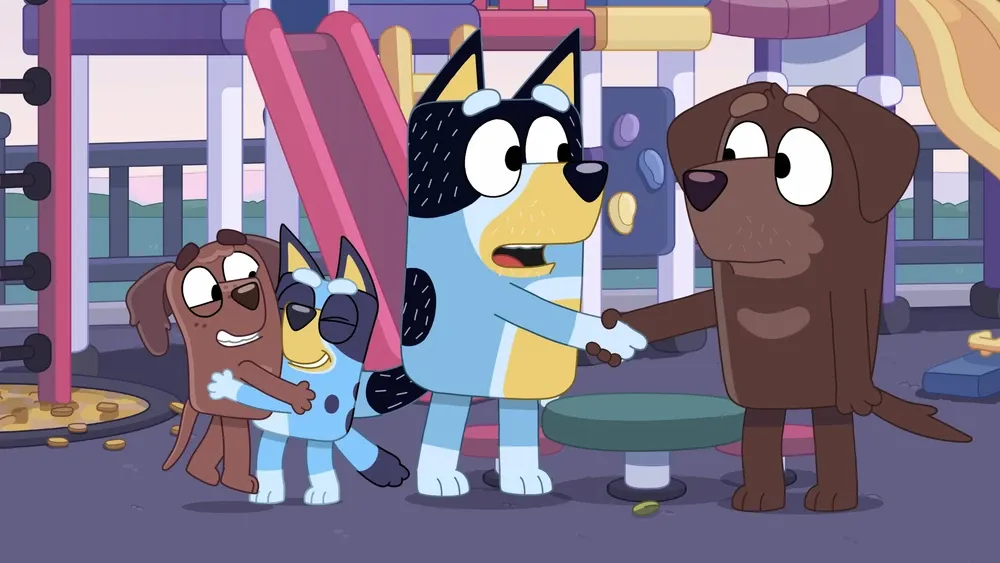What Bluey Taught Me About Adult Friendships
A kids’ show about cartoon dogs taught me more about adult friendships than I expected. Bluey's “Café” episode reflects how grown-ups form bonds—slowly, awkwardly, and often thanks to our kids. Here’s what I’ve learned about connection, overthinking, and taking the lead.

I am a massive fan of the kids’ TV show Bluey, and I love watching it with my son. It’s so well written that people of all ages can understand and enjoy it. It speaks on so many different levels. Of all the episodes I’ve watched (which is pretty much all of them), the one I always find the most amusing (and the most relatable) is the episode titled Café.
If you’ve not watched the episode, here is a ChatGPT-generated summary:
Bluey meets a new friend named Winnie at the park. Eager to extend their playtime, Bluey invites Winnie and her dad over for breakfast. However, she soon discovers that adults don’t form friendships as quickly as kids do. This heartwarming episode gently explores the different ways children and adults build relationships, highlighting Bluey’s growing understanding of social dynamics.
I always find it amusing how the dads are forced into this against their will. From one dad to another, I find this episode resonates with me on so many different levels, based on the friendships I’ve made over the years. Even though my son is much younger than Bluey, I completely understand what it’s like to be in Bandit’s (Bluey’s dad) shoes, having attended many toddler groups where this has happened to me.
I never thought I’d be saying this about a kids’ show on my blog, but I feel there’s a lot we can learn from this episode. In response (I suppose you could call this a review of sorts), I thought I’d share a few thoughts I had on adult friendships, and what the episode teaches us about them.
Friendships Develop at Different Paces
Whether you’re a child or an adult, we all develop friendships at different rates, as we all come in different shapes and sizes. In the episode, the friendship between the dads starts off slowly but grows each time they meet. Some of us are naturals at socialising; others, like me, need a lot of practice. Some are extroverts, while others are more introverted. Some like to make bold, outgoing gestures, while others may prefer to be more subtle. You get the gist?
We’re not all the same. While it’s true that children form friendships faster than adults (note to self: find evidence to back this up!), there’s no right or wrong approach to developing friendships. Depending on the people involved, sometimes a friendship can take off quickly, while others slowly develop over several years. Both are valid! It doesn’t always have to be an instant thing. In fact, I can think of only a handful of times when that’s happened to me. I’ll say it again, as I feel it’s worth reiterating: we are not all the same.
Taking the Lead
Sometimes, in a friendship, we may need to take the lead and offer an invitation. Whether it’s a game of football, a cycle ride, or—like in Bandit’s case—breakfast, making that initial invitation can be scary, but it might mean a lot to the person on the receiving end.
A simple, practical example might be sending a quick message to a friend, wishing them well for the day. It’s effortless, and people appreciate it. In my experience of doing this, people genuinely do appreciate you reaching out to them. I know I do when others do the same for me.
Kids Don’t Overthink
I think my main takeaway is that kids don’t overthink things in the way adults do. I’m an overthinker—and I’m sure I’m not the only one—but socialising (especially if you’re introverted) can be exhausting. There are just so many things to think about. Do they like me? Do they not like me? How do I start a conversation? What should I say? And so on...
But do kids think like this? Probably not. At least, I know I didn’t when I was young. Instead, kids just... well, be kids! They don’t overthink it. They’re still learning and navigating the world, so they don’t carry the same social filters or fears that adults do.
There’s that age-old saying our mentors and parents used to tell us: “just be yourself.” As I’ve got older, I’ve learned to both practise and dislike this saying at the same time. “Who am I?” or “What is the real me?” are both valid questions I’ve asked myself. But I’ve rarely taken a step back to consider what this phrase actually means.
Being yourself, in my view, involves doing the things you enjoy, behaving in the way that feels natural to you, and saying the things that come naturally. In other words, it’s about your default mode—your honest, unfiltered self.
Final Thoughts
This is a rather long post about a Bluey episode, but these are some longer and deeper thoughts I’ve had about adult friendships, and I hope they make sense to you. They may even be of some help. I genuinely believe there’s a lot we can learn from our kids’ behaviour and their outlook on life.
I’m reminded of a Bible verse from Matthew 19:14 about children and their relationship with Christ:
But Jesus said, “Let the little children come to me and do not hinder them, for to such belongs the kingdom of heaven.”
There’s a lot we can learn from our kids, and I’m curious to see how this will play out in my own life when my little one is old enough to start forming friendships of his own.


